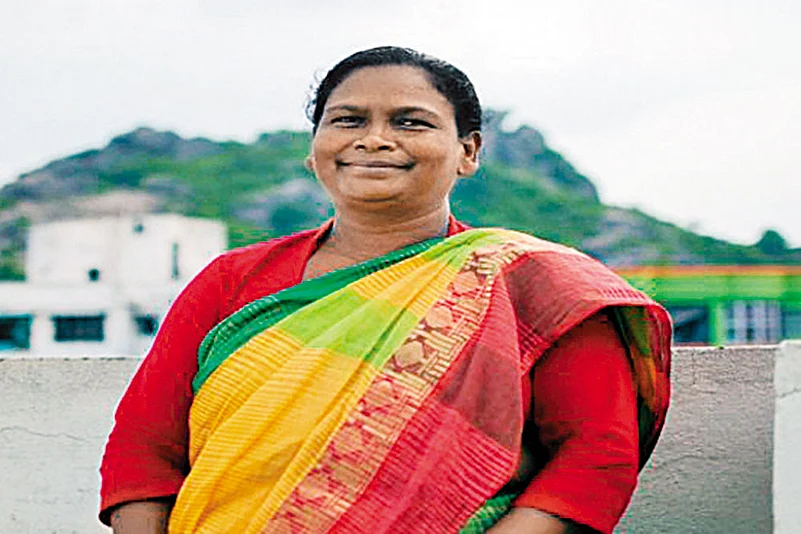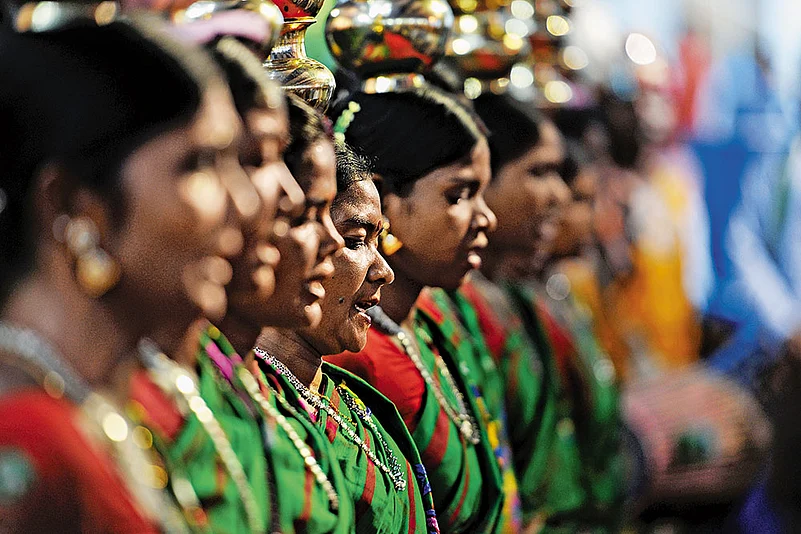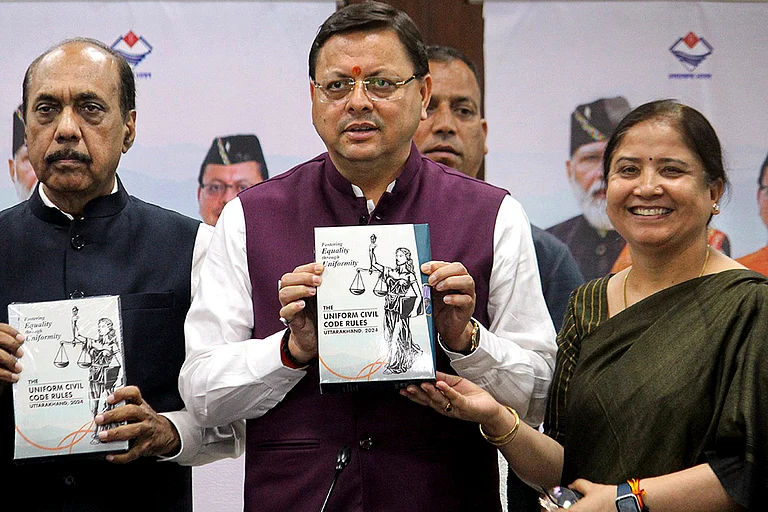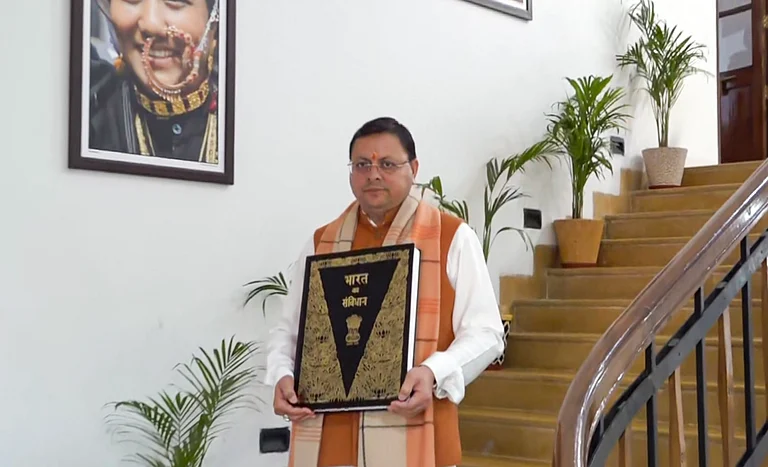Bitiya Murmu, who lives in Dumka district of Jharkhand, has fought a long battle knowing well that her next generation would not get the rights over the land that she and her sisters have fought for. Murmu, who is in her late 40s, was just a child when her father passed away and her widowed mother had to live on the mercy of others, even though the family owned a piece of land. The family fell prey to the Santhal customary laws that don’t give ancestral property rights to women. In the absence of a male figure—father or brother—the land was snatched away from them.
Would Bitiya and thousands like her have suffered had there been a Uniform Civil Code? Murmu, who now leads the Ekal Nari Sanghathan, an organisation that has been fighting for the rights of the Adivasi women, says: “We don’t have any codified laws. Customary laws are not written. In a patriarchal society, no one is bothered about our rights.”
What they need is a written code that will ensure that they will have right over not just their ancestral property but also over property owned by their in-laws.
As the current dispensation has been working constructively to bring in the UCC and has been very vocal about it, it is crucial to look at how millions of indigenous people would be affected if it gets implemented. While there are diverse opinions prevalent among different indigenous communities related to safeguarding their customs secured under Article 29 of the constitution—protection of interests of minorities—the debates over marriage codes and women’s right to property have gained significant traction.

Marriage, Divorce And Flexibility
In 2016, when the Law Commission of India sought the opinion of people on UCC, the Rashtriya Adivasi Ekta Parishad, a group that claims to represent 11 indigenous communities across India, filed a petition in the Supreme Court seeking its intervention to protect the customary rights of Adivasis. It said that such a move would have an adverse impact on 6,743 castes across the country.
It referred to the existing polygamy practice among Naga tribes, the Baiga, the Lushai and the Gond, among others. Besides, their petition notes, polyandry is prevalent among several communities like the Tiyan, the Toda, the Ladhaki Bota, the Rota and the Khasa—stretching through the Himalayan belt- from Kashmir to Assam.
Their demands to safeguard the rights of polygamy and polyandry come from the inapplicability of the Hindu Marriage Act, 1955 among the Adivasis. Section 2(2) of the Act excludes Scheduled Tribes (ST) from its ambit. While advocacy groups like Rashtriya Adivasi Ekta Parishad are in favour of upholding the customary rights in the case of marriage, scholars are of the opinion that such practices should be discussed in detail and accommodated in a few cases if an inclusive civil code is to be envisaged.
Anil Nair, a professor of law at the National University of Advanced Legal Studies, Kerala, brings in the reference of the fraternal polyandry, a practice among Toda community endemic to the Nilgiris where a woman marries more than one man—mostly brothers.
This practice could be found among Kinnauris who reside in the Kinnaur region of Himachal Pradesh and claiming ancestry from the Pandavas of Mahabharata. “It was also legal among other communities like Nanjanad Vellala, Mannan, Muthuvan, Mavilan etc. in Kerala. Wherever such communities got protection as ST, the customary practices by and large continue,” says Nair.
This practice probably evolved “to keep the property within the family, and in the context of Kinnauri’s, the brother who goes against such marriage agreement loses the entire share of the property,” adds the legal scholar.
However, in the case of divorce, the Adiyar community in Wayanad, Kerala considers the elopement of a married person as a valid form of divorce with a previous spouse and remarriage with the new person.
“Can our so-called ‘civilisational’ progress accept such a custom or provide space for it?” asks Nair. As there is some in-built flexibility in the Adivasi way of entering and exiting marriages, no Victorian morality would be able to accommodate the diversity.
Murmu, however, wants codified laws for marriage and divorce. “In our society, at least in 30 per cent of the cases, men leave their women a few years after the marriage. The women, having no rights over the ancestral house, are left to the mercy of the society,” she says.
According to Murmu, the rate of abandonment is high due to the absence of any written law. “Five people gather and decide whether the man should ‘keep’ the woman. This is tragic and unacceptable to us,” Murmu adds. She claims that the UCC would give Adivasi women their due rights.
Women Denied Inheritance Rights
Murmu’s struggles for years, nonetheless, focus on the rights of women over the ancestral property that she believes would provide them the rightful resource to live by. The customary laws among Santhals don’t give women the right to inherit their father’s property.
Section 20 of the Santhal Pargana Tenancy Act, 1949 only gives those women the right to inherit the property who marries a man and makes him a ghar jamai (resident son-in-law). Notably, the marriage must be held during her father’s lifetime. However, even in this case, she would have to share the property with her husband.
Against this backdrop, can UCC be considered as a universal panacea for Adivasi women? Topi Basar, a legal scholar and professor of law at Rajiv Gandhi University, Arunachal Pradesh, says: “If we examine the UCC purely from the gender perspective, the moot question that comes to mind is—will such an initiative by itself achieve gender equality and empowerment. Will it actually ensure a woman’s right to immovable property from her father without having her approach the court for its enforcement?” Several Hindu and Christian women are not enjoying such a privilege even though their laws provided them the right, she adds.
“Five people gather and decide whether the man should ‘keep’ the woman. This is tragic and unacceptable to us”
The inheritance rules of the customary laws in the north-eastern states don’t provide women the right to “ancestral movable property” but it is extended to the movable properties. However, it is permissible for father to give a share to his daughter in his self-acquired property. In a multi-layered heterogenous society, Topi Basar notes, “if proposed UCC is going to fill the gender equity gaps that exist in customary laws that would be desirable, but if the UCC leads to the replacement of customary institution altogether, it will disturb the core cultural base of indigenous people.”
On December 9, 2022, the Supreme Court even evoked the rights of the Adivasi women over the ancestral property and said: “When the daughter belonging to the non-tribal community is entitled to equal share in the property of the father, there is no reason to deny such right to the daughter belonging the tribal community.”
Resistance From North-Eastern Tribes
While the rules of marriage and succession in the Adivasi customary laws have been a matter of contention across India for decades, the case of north-eastern states invites separate attention. In February 2023, the Mizoram government, ruled by the Mizo National Front (MNF), unanimously passed a resolution against the UCC. Home Minister Lalchamliana pointed out that the UCC, “would disintegrate the country as it’s an attempt to terminate the religious or social practices, customary laws, cultures and traditions of the religious minorities, including the Mizos.”
The case of Mizoram is also significant on the ground that its customary and religious laws are protected under Article 371G of Indian constitution that deals with special provisions for the state of Mizoram. Similar reactions came from Meghalaya Chief Minister Conrad Sangma whose National People’s Party (NPP), despite being a Bharatiya Janata Party (BJP)-ally, didn’t back the UCC proposal. In 2017, when Nagaland government took the decision to provide 33 per cent reservation to the women in municipality elections, it led to socio-political disturbances, consequently dethroning Chief Minister TR Zeliang.
Whenever there is a discussion around the possibility of implementation of UCC, why is there resistance from tribals in the northeastern states? Explaining this, Professor Topi Basar says: “UCC vis-à-vis tribal communities, those in the north-east in particular, is a complex matter. The socio-cultural contexts of tribes in the northeast are very unique and peculiar to each tribe. Even the gradual introduction of the general laws of the land has not disrupted the existing system.”
The tribal customary laws work expeditiously when it comes to dispute resolution. “It is definitely a cheaper and faster means to get justice for poor who can’t afford expensive legal machineries,” she adds. Despite the presence of impendent judiciary in Assam, the prominence of Gaon Buras and Gaon Buris as the top village councils points to the social acceptance and embeddedness of customary laws.
In this backdrop, UCC cannot be implemented automatically. “If the general spirit and objective of the UCC is made to recognise these subtleties present in indigenous traditional systems, it will be a more feasible approach,” notes the scholar.
The diversity of perceptions pertaining to the implementation of UCC among Adivasis seems to be an unending debate, but there is hardly any disagreement over the fact that women like Bitiya Murmu should get succession rights.
MORE FROM THIS ISSUE
Like Murmu, Sabitri Munda, who lives in the small village of Khunti in Jharkhand, too is hopeful. Munda, who is in her late 30s, has been marked a witch. She is waiting for the day when the law of the land will change and her only daughter, now in her teens, would get her rights that she had been deprived of due to the prevalence of customary inheritance law.
(This appeared in the print on 11 June 2023 as 'Beyond The Civil Codes ')

































